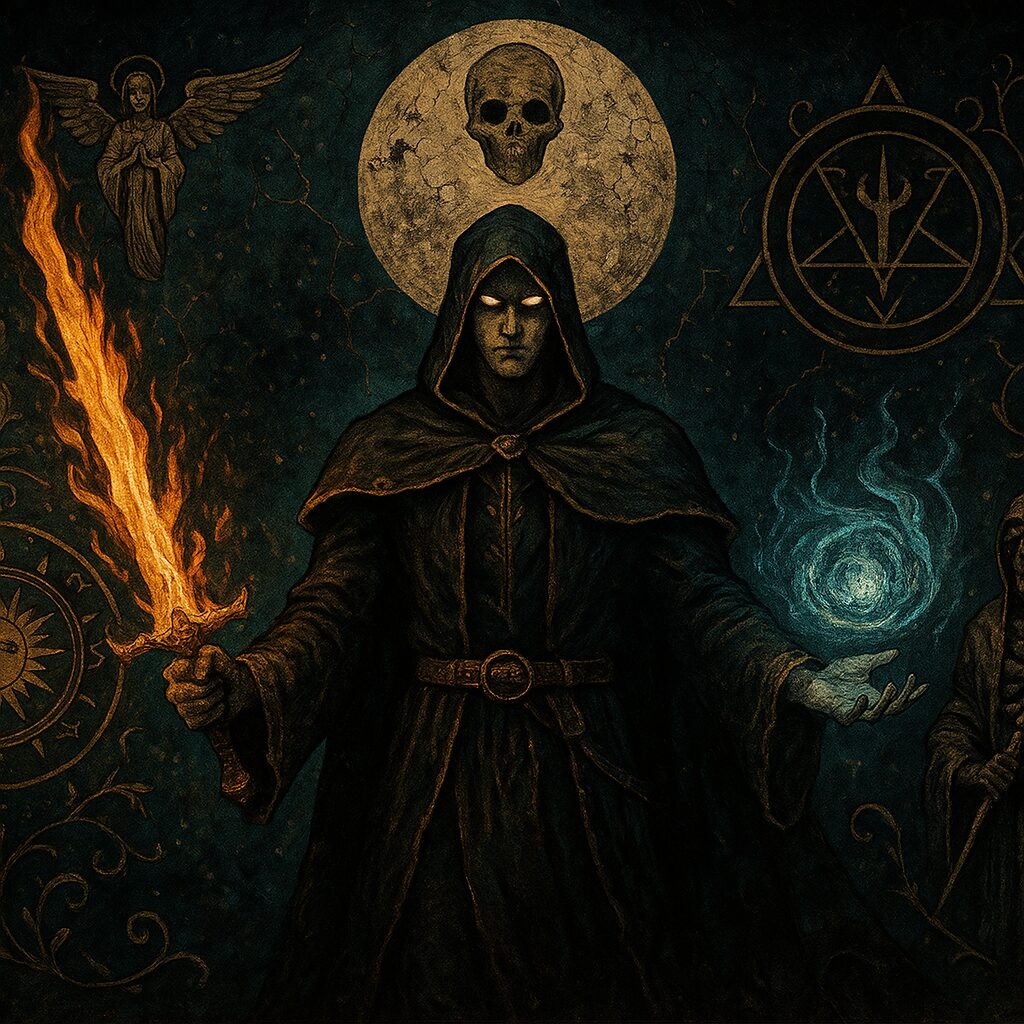“To transcend the illusion of death, one must walk hand in hand with it.”
Introduction: A Game or a Gnostic Trial?
From the very first plunge into the dungeons of Death Must Die, something strange and sacred stirs. This isn’t just a rogue-like with slick controls and cool gods. No — it’s an esoteric experience dressed in pixels, a spiritual allegory masquerading as gameplay.
This is a game for the mystic warrior — one who sees behind the veil, who seeks not only to conquer Death, but to comprehend it.
The Ritual of Descent
Every run begins the same: you, the Seeker, reborn again. The dungeon is no ordinary maze. It is a metaphysical labyrinth of becoming. As in ancient initiatory rites, you are stripped of certainty and cast into chaos.
But this is the soul’s true training ground. Each level represents a deeper descent — like Dante’s Inferno or the chambers of the Egyptian Duat — where one’s flaws, sins, and latent strengths emerge through battle.
Like the Fool of the Tarot, you leap into the unknown. But unlike a traditional game where success is measured by victory, Death Must Die reveals that true mastery comes through surrender, repetition, and conscious death.
Sacred Combat: Slaying the Inner Legion
The combat is fast, satisfying, and fluid — but there’s something more happening under the hood. Every enemy is not merely a monster. They are symbolic fragments of the self: the crawling doubt, the spitting rage, the blind herd.
Your weapons, then, are instruments of inner alchemy. Every spell you hurl is like casting a Kabbalistic sigil. Every dodge is a monk’s breath — the pause between intention and action.
Mystical Combat Mantra:
“Strike as if striking ignorance. Move as if dancing with your shadow.”
The Gods Within: Archetypes as Patrons
Perhaps the game’s most spiritual feature is the pantheon. These are not merely buffs or passive perks — they are archetypal mirrors. Choosing a god to follow is akin to invoking a spiritual current. Each has their domain, their rhythm, their mystery.
Let’s look at a few:
☀️ Sol, the Lightbearer
Represents inner clarity, purpose, and righteous fire.
His powers feel like a solar initiation — a reminder to burn away the dark with conscious will.
🜏 Mort, the Lord of Death
Embraces decay, transformation, and finality.
By aligning with Mort, you do not reject death — you merge with it. True memento mori gameplay.
🌀 Nyra, the Trickster
Echoes chaos, reversal, and the unexpected.
She teaches that reality is fluid, and only the playful survive long enough to understand its malleability.
Each deity speaks a silent truth: You do not choose them. You recognize them — as reflections of your current state of being.
The Deathless Gnosis
In many mystical traditions — Gnosticism, Vajrayana Buddhism, Hermeticism — Death is not the end but the gatekeeper.
The initiate must die before they die, to escape the cycle.
Death Must Die echoes this spiritual maxim. Every death in the game teaches. Every return reconfigures the inner pattern.
It is not that we kill Death… but that we see through it.
The Dungeon as the Soul
Every room, every wave of enemies, is a manifestation of your inner chaos. The dungeon is not “somewhere else” — it is within. The deeper you go, the more intimate your trials become.
Environmental hazards? They are like karma — impersonal, dangerous, but fair. You either learn or you repeat. And repetition, in this context, is not punishment — it is purification.
The Gnostic Mechanics
- Permadeath = The soul forgetting past incarnations, yet retaining impressions.
- Skill Trees = The Tree of Life (Etz Chaim), slowly unlocking through lifetimes.
- Upgrades = Alchemical transformation. Base metals to gold. Ego to Essence.
- Bosses = Guardians of Thresholds, initiatory trials. The only way forward is through.
Conclusion: A Game for the Spiritual Warrior
Death Must Die is not just a well-crafted rogue-like. It is a hidden scripture in disguise. A game that teaches through loss, guides through chaos, and whispers through its mechanics:
“Die well. Rise always. And remember why you came.”
It is a game for those who meditate with a controller. For those who know that even pixels can teach the soul.
ZionMag Verdict:
⭐️⭐️⭐️⭐️½ – An initiatory journey in rogue-like form. Recommended for mystics, occultists, dreamers, and warriors of the inner world.
